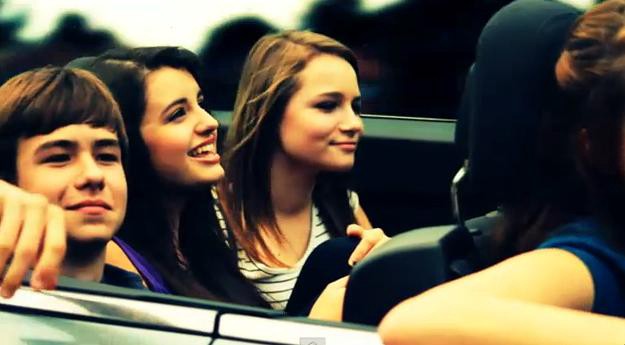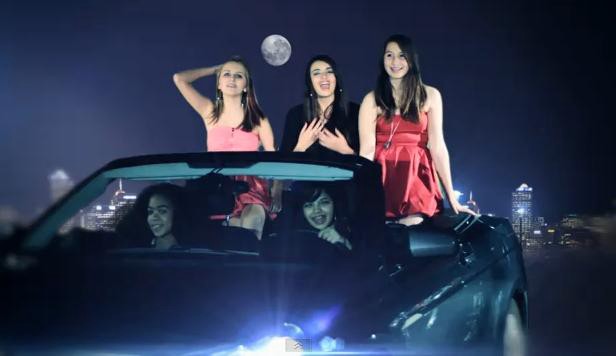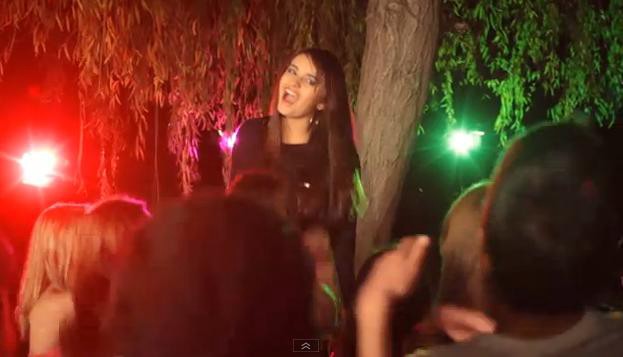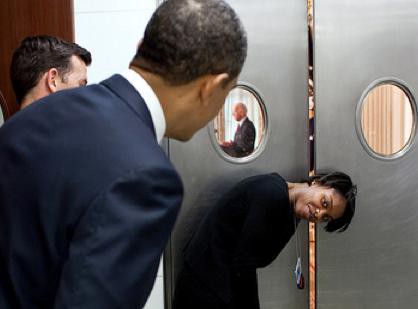Arms So Freezy: Rebecca Black's "Friday" As Radical Text
by Dana Vachon

Rebecca Black wakes somewhat too perfectly in the early scenes of her viral video, “Friday.” Her eyes open exactly as the clock beside her bed flashes seven. She wears full make-up. Rare for a teen, she isn’t tired, longs not for any receding dreams.
Her cultural debt is less to Molly Ringwald in Sixteen Candles than Evie Vicki the robot girl from Small Wonder, we realize, as in a voice controlled by Auto-Tune she enumerates the banalities of an anti-existence: “Gotta be fresh, gotta go downstairs, gotta have my bowl, gotta have cereal… gotta get down to the bus stop.”
She offers the camera a hostage’s smile, forced, false. Her smoky eyes suggest chaos witnessed: tear gas, rock missiles and gasoline flames. They paint her as a refugee of a teen culture whose capacity for real subversion was bludgeoned away somewhere between the atrocities of Kent State and those of the 1968 Democratic Convention, the start of a creeping zombification that would see youthful dissent packaged and sold alongside Pez and Doritos.
“Look and listen deeply,” she challenges. An onanistic recursion, at once Siren and Cassandra, she heralds a new chapter in the Homeric tradition. With a slight grin, she calls out to us: “I sing of the death of the individual, the dire plight of free will and the awful barricades daily built inside the minds of all who endure what lately passes for American life. And here I shall tell you of what I have done in order to feel alive again.”
***
Ms. Black first appears as her own computer-generated outline: wobbly, marginal, a dislocated erasure. The days of the week flip by accompanied by dull obligations — “essay due” — and tired clichés — “Just another manic Monday…” Her non-being threatens to be consumed by this virtual litany of nothing at all until, at long last — Friday.
She moves from a home made vexing by obligations to the bus stop and there, in the public sphere, appears to find freedom from authoritarian programming in the form of a Mercedes convertible filled with high-status peers.
They stop and invite her to join them, a moment evoking Fitzgerald’s Tender is the Night but with a postmodern twist suggestive of a post-historical amnesia: On this “Friday,” it is no longer French leisure but German engineering that promises delivery from the snares of family and self-image.
“Gotta make my mind up,” she sings, overjoyed to finally exert some control over her fate; “Which seat can I take?”
Yet here the discerning viewer notes that something is wrong. Because it is a simple matter of fact that in this car all the good seats have already been taken. For Rebecca Black (her name here would seem to evoke Rosa Parks, a mirroring that will only gain in significance) there is no actual choice, only the illusion of choice.

The viewer knows that she’ll take the only seat that’s offered to her, a position so very undesirable as to be known by a derisive — the “Bitch” seat.
She might well have been better off on the school bus, among the have-nots. But Rebecca Black’s world is so advanced in the craft of evisceration that this was never a consideration. John Hughes died while out jogging, these are the progeny of his great materialist teen-villain, James Spader, a name that would come to be synonymous with desperate sex and high-speed collision. And as she gets in the car Ms. Black’s joy is as patently empty as her liberation.
“Partying, Partying,” she sings, in hollow mantra.
“Yeah!” an unseen mass replies, a Pavlovian affirmation.
For Time — in its relativity, brutality and absurdity — is one of “Friday”’s great targets. In an instant day passes to night, and the realism of the bus stop gives way to a surreal blue-screen panorama of a full moon and false city running on loop as Ms. Black rides in the convertible, apparent-heiress to the grand American tradition of high school cruising, that curious space birthed by Cold War highways (themselves relics of our atomic fears) in which teenagers first experienced themselves as such.

Only Rebecca Black is not cruising. She is manifestly standing still, with not even a wind machine to help sell the con. This, the viewer cringingly notes, is not freedom but freedom’s cheap simulation, not the speeding liberty of earlier generations but a gross, benumbed mockery of it — the individual has collapsed, and language with him.
“The crying tires, the busting glass, the painful scream that I heard last…” sang J. Wilson and the Cavaliers, when pop still admitted technology’s collusion with death. But that time is gone. For Rebecca Black there is only graphic effect, materialist schizobabble, “I got this, You got this…” she sings over and again, citizen as gaping appetite, grammarless and hungry.
***
And then arrives at a house party, a place absent of authority, the aim of Friday night.
“Partying, Partying,’” she sings again, now in detached self-narration.
“Yeah!” reply her friends, and then the sequence is repeated to evoke the grand progenitor of all American music, the call and response of a Negro spiritual, harkening back to our nation’s great unhealing wound, slavery itself.
Are these not slaves of a kind? Are they not trapped here? Is consumerism not just another form of forced labor? In an age of harvested data and biological determinism there is no will and so no freedom of it — only constant manipulation of the pleasure principle, the bleary throbbing of overtaxed dopamine centers.
Three girls march single-file into the house, eager for introductory lessons to chemical abuse, sexual politics, personal branding — the sickly trinity of numbness that will see them through whatever non-lives the data banks ladle out to them.
We return to the computer graphic calendar sequence, the litany of days: Ms. Black’s image flickers across the screen, now doubled, fractured, schizophrenic, threatening Kleboldian frenzy — as we cut to an African-American man in his early thirties.
He wears diamond earrings, a light beard, drives across the familiar blue-screen cityscape. He alone seems untaken by the false images around him. Is it because he can’t forget American brutality? Does ancient bondage keep him from modern numbness? Is he protected from pharma and plasma by fire hoses and cotton fields?
In broadest terms, the answer is yes: Ms. Black’s parents have paid this rapper to appear in the video as a conduit to ghetto rawness, hired blackness, an invigorating hit of the Other. He is a peddler of “the real” in a false-era of commoditized suffering.

But who is he within the text?
“Yeah, Yeah, R. B., Rebecca Black,” he raps. “So chilling in the front side, In the back seat, I’m driving, cruising… Passing by is a school bus, in front of me…” he continues, though by now the core questions have been raised.
How does he know the name of a girl so many years his junior? And why, after speaking her name, does he talk not of the front seat, but the front side, known slang for female genitalia? Why, after referencing this, does he so pointedly, grinningly, look to his own groin?
Does he note the school bus because he knows it to be Rebecca’s primary mode of transportation? Is it possible that he is now pursuing her, “driving, cruising” to the very party that she is at? Is there any other plausible explanation?
But why would he be headed there?
Here we may profitably consider two of rap’s classic male types.
He may be a “hustler”, a drug-dealer archetype, a man raised in the projects amid roaches and rags, smokers out back, selling their mother’s sofas, look-outs on the corner. As such he would be headed to the Rebecca’s party to sell her and her friends assorted narcotics.
But such a view is cynical, perhaps racist, certainly lazy. Consider his genital self-referencing, his otherwise inexplicable interest in Ms. Black, whose apparent lack of drug-involvement further discredits the hustler scenario.
He is far more likely a “player” or “pimp,” rap’s Lothario archetype, a man whose interest in loving then leaving women is grounded in 1) “Cheese” and 2) The assertion, less misogynistic than anti-Abrahamic, that he doesn’t need them.
Perhaps this explains the outsized revulsion/fascination engendered by “Friday,” which we may now understand as a double-backed retelling of Lolita and Othello: The man before us is clearly speeding towards a illicit sexual assignation with our underage heroine.
***
The beating heart of “Friday” is indeed this hip hop Humbert Humbert with whom Ms. Black has joined in a meta-taboo of race, class and sex.
What we are seeing here is no mere rap interlude but a sly reference to the endless driving scenes in Kubrick’s adaptation of Nabokov’s work, a crypto sex scene from which we return to the suburban house party.

Where Ms. Black stands no longer among but above her peers, clearly celebrated for refusing the carnal diktats of a society which claims to revere sex and youth and the individual but which, by packaging these ineffables as items of disposable convenience, renders all to nothing.
She has followed the sexual urge across every boundary to recover a clear and choosing self, and in her freedom all may find hope.
A phallic tree trunk behind her marks the completion of the anarcho-sexual odyssey, cock as axis mundi, Moses as Lolita. Then, to further highlight the doneness of the deed, she’s suddenly in a red-lit room, a private space, sustaining a single note at once suggestive of childish tantrums, orgasmic ecstasy and Taliban ululation.
At last she is free from Auto-Tune. Deprogrammed, as it were.
We cut to our pimp, her lover, driving with one hand on the wheel, the other waving in R. Kelly-esque bravado, as he races fast back into the undifferentiated Other. The city is no longer visible out his windows. It has been replaced by streaming, colored lights that serve to unify him with the now-aptly named Ms. Black — together, they have obliterated the false landscape.
People are scandalized, as they ought to be.
The apparent frivolity of “Friday” is only its most cunning aspect, a bubble-gum Trojan horse containing a radical text throwing itself against the gears of a death-bound society. And in Ms. Black’s voice we hear the full cry of a revolutionary age, Benghazi echoing across Orange County, the ancient wail of all who have ever wanted more.
Dana Vachon is a writer living in Manhattan, followable on Twitter.
Maine Governor Creates Jobs! (Painting Over Pro-Worker Mural)
“Maine Gov. Paul LePage has ordered the removal of a 36-foot mural depicting the state’s labor history from the lobby of the Department of Labor headquarters building in Augusta…. Don Berry, President of the Maine AFL-CIO, issued a statement… ‘It’s a spiteful, mean-spirited move by the Governor that does nothing to create jobs or improve the Maine economy.’”
— Incorrect! Somebody’s gotta paint over that mural. Now that’s job creation we can believe in!
Scientists Say They've Created Heaviest Form Of Antimatter Ever
“A newly created form of antimatter is the heaviest and most complex anti-thing ever seen. Anti-helium nuclei, each containing two anti-protons and two anti-neutrons, have been created and detected at the Relativistic Heavy Ion Collider (RHIC) in Upton, New York.”
— The physicists at the Relativistic Heavy Ion Collider in Upton, New York have clearly miscalculated. The heaviest and most complex anti-thing ever seen is the missing tip of the middle finger of Tony Iommi’s right hand. Everybody knows that.
Ladies Hatch a Conspiracy to Take Libya!

Not only are people afraid that our Libyan adventure is being run by ladies like Hillary Clinton and Samantha Power (who is terrible), it’s also actually being run by a woman, Air Force Maj. Gen. Margaret Woodward, who’s been the commander of Seventeenth Air Force since last summer. Oh my God, there are literally maybe four women in relevant positions of power (I’m counting Susan Rice, our ambassador to the U.N.)! WHY DO WOMEN WANT GADDAFI’S OIL? And what will men do now? Why won’t Joe Biden do something?
Yet Another Adorable YouTube Sensation Actually Predicated On Cruelty
Yet Another Adorable YouTube Sensation Actually Predicated On Cruelty

“The only reason the loris isn’t biting the person holding it in the video is because it has had its teeth ripped out with pliers.”
— Animal rights activist Chris Shepherd tells you what’s really going on in those viral videos which show slow lorises — tiny primates native to Southeast Asia — being tickled and holding up cocktail umbrellas. While the clips seem awww-worthy, the reality is far more sinister: “Although the creature may look happy, it submits to being tickled as a passive defence-mechanism to deal with stress. The loris is a nocturnal animal and is effectively being blinded by the daylight in the videos. Disoriented, it grasps at the umbrella believing it is the bamboo of its natural terrain.”
It's Time for a Radical New Sulzberger Hairstyle

There comes a time in the life span of many men when it is time to start shaving one’s head, or at least adopting a modified crew-cut. At the age of 59, that time has very nearly come for Arthur Sulzberger, Jr. I say this not with rancor or cruelty! It’s just that the balding experience creeps up on one, and it’s so hard to tell what one looks like, and no one likes to tell their friends these things, it’s always awkward.
Berlusconi Bunga-Bunga Party Pictures: That's It?
The first pictures from one of Italian Prime Minister Silvio Berlusconi’s infamous bunga-bunga parties are out, and they’re… well, they’re a little disappointing. “Discovered on laptops and cameras seized by prosecutors,” the photos show a TV hostess dressed as a policewoman and “unidentified women about to kiss as well as women in provocative poses.” I mean, I guess we should be grateful that they don’t show Silvio in provocative poses, but I was really hoping for more. This is like the amateur hour Italian version of those “Girls Gone Wild” commercials.
Elizabeth Taylor, As We Remember Her
Elizabeth Taylor — Oscar winner, legend, crusading fundraiser (who raised tens of millions of dollars for HIV prevention, treatment and advocacy) and also genetic mutant — has passed away, at the surprisingly tender age of 79.
Science: Exercise Is Bad

“What we really don’t want to do is for the public to walk away from this and think exercise is bad.”
Tufts researcher Jessica Paulus discusses recent findings that show “people are 3.5 times more likely to get a heart attack or have sudden cardiac death when they are exercising compared to when they are not. And they are 2.7 times more likely to get a heart attack when they are having sex or immediately afterward compared with when they are not.” The lessons seem pretty clear to me: Don’t ever exercise — and don’t have sex with someone who has just exercised — and everyone will be just fine.
